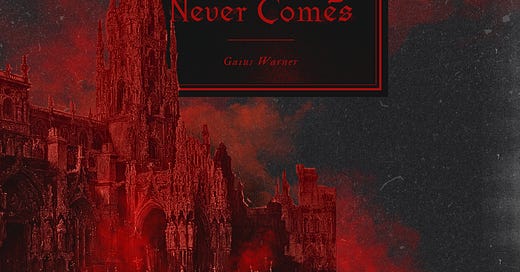If Morning Never Comes - Episode Twelve
In Which: Dreadful Truths Are Revealed
Welcome back to “If Morning Never Comes,” a serial adventure of gothic peril from and proudly published by .
If this is your first time with this serial story of adventure and peril, start at the beginning! - Episode One | In Which: We Meet the Ashley Family
If you got lost, visit the Table of Contents! - If Morning Never Comes
Charles Ashley was drowning in deep waters. He was not awake, yet could this be a dream? The sky was dark and close, the waves carrying him far away. Beneath him something ancient stirred. He felt without feeling a thousand long tentacles – reaching, searching, clutching. He submerged. There was no sound, no smell, only the oily grasp of the deep. The sea was so cold.
Then, muffled through the watery expanse came a voice. Dampened syllables from a strange tongue called to him. For a moment the constriction around him tightened, but the voice rang out stronger. He felt himself rise from the depths. A light rippled through the water. Strong hands bore him up.
A splash and a gasp. Charles opened his eyes.
He was on the ground in front of a roaring fire. His arms and legs were wrapped up in blankets, tight but comfortable. The firelight did not fill the room; shadows skulked in the corners. Charles recognized the library. He craned his neck for a better view of his surroundings. Movement caught his attention.
At his head, a short rifle across his knees, Georg Stryker sat watching him.
Charles was surprised, but he did not react to the sight. His mind felt sluggish, his body slow to respond. Stryker laid the weapon on his chair and leaned over him.
“Are you awake?”
Charles blinked then nodded. Stryker sighed deeply and ran a hand over his face. His hands were gloved in thick leather, worn and creased. He pulled them off and knelt by Charles’ side.
He murmured in his own language as he placed ragged hands on the side of the younger man’s face. He turned Charles’ eyes to look into his own blue ones. He placed his hands onto Charles’ neck and chest, inspecting him. His hands were warm. Charles was very cold.
The old man stood and stretched his back, then regained his seat, taking up the rifle once again.
Charles slowly regained his senses. He panned his eyes over the little room, the walls stacked with books. The far end was in darkness, but the little table and chairs glowed in the light. Stryker sat in his chair unmoving. Charles noticed the peculiar way he was dressed.
He wore tough, tall boots, worn like his gloves. He was draped in his long, tattered coat, a three-cornered hat upon his head. It was unusual for Stryker to cover his head indoors. Aside from the gun in his hands, Charles could see a pistol hanging from a holster around his chest, as well as a sheathed sword at his side. The shirt looked thick and uncomfortable. The collar bunched up at the base of his neck. It looked to have enough buttons and material to cover his face. Around his neck hung a bright silver cross with a figure of Christ still visible despite its worn edges and obvious age.
Charles also noticed a pungent smell filling the air. The scent roused his mind further, and he felt his strength begin to return. He tried to speak, then coughed to clear his throat. His voice was scratchy.
“Why are you dressed like that?”
Stryker smiled for a moment, but only a moment. He took a deep breath and let it out before answering.
“You’re feeling better, then?”
“A little,” said Charles. His limbs still felt heavy, his memory fuzzy. He was sure something dreadful had happened, but the details escaped him.
“What happened?” he asked.
“You took ill,” Stryker responded.
“No,” said Charles, eyes up on the ceiling. “Something happened. I fell, and there was a blast and – another blast and...“ he trailed off.
Stryker did not offer any supplementary details. He sat like a stone, eyes fixed on Charles.
Charles tried to think. He remembered the moor and the moon and the deep water. No, that was his dream. He remembered falling and –
“Amelia!” cried Charles.
Stryker sat taller and gripped his weapon. Charles raised himself up on an elbow and turned to look at him directly.
“Amelia was here! She came to see me, and I went out to meet her and – oh confound it, why can’t I remember?”
“You have had a very difficult evening, Charles Ashley,” said Georg Stryker. “You’re confused. You should try to sleep.”
Charles shook his head. He knew he was confused, but there was truth scattered amongst his delusions.
“Amelia was here,” he reiterated. “And I went out to see her. And I fell.” He tried to catalogue everything he knew, to separate fact from fancy. “There was an explosion. Or more than one.” He made eye contact with Stryker. “What was that, Herr Stryker?”
“Charles, you should sleep,” said the German.
The fear of what might have happened gripped Charles in a sudden fit. “No!” he cried, waking up fully. He tried to stand, but grew dizzy and stumbled to one knee. Stryker was up, faster than Charles could follow. He took him by the arm. Charles leaned on the old man.
“Help me up.”
“No, Charles,” the old man insisted, “You must rest.”
“Why?” asked Charles, growing nervous the longer the man didn’t answer. “What’s happened to me?”
“Nothing has happened to you Charles, I swear it.” He tried to lay him back down.
Eventually his fatigue got the better of him and he allowed Herr Stryker to help him cover up again. Charles caught his breath and lay still. The fire was warm, although the odd scent still came in gentle waves. It was familiar, but Charles could not place it. Stryker kept his post at his side.
Finally, Charles sighed and tried again, “Will you please tell me what’s going on?”
Stryker gave no answer, but Charles heard him exhale through his nose.
“Herr Stryker, please don’t lie to me.”
The old man answered quickly, “Charles, I would never lie to you.”
Charles believed him. “Then tell me the truth. Was Amelia here tonight?”
A long silence. Finally Stryker said, “Yes.”
“And I went out to her?”
“Yes.”
Charles took a moment to adjust to the information. So she had come after all. She had lured him out of his room somehow and he had met her on the hilltop. But then what?
“Did I fall?”
“Yes.”
“Was there an explosion?”
“No.” Another pause. “And yes.”
Charles turned his head. “What does that mean?”
Stryker’s eyes were closed, his shoulders back. “Gunshots, Charles. Not explosions.”
Charles felt the need to clarify: “You didn’t shoot her, did you?”
“Yes.”
The younger man reeled and sat up, turning around to face the man in his strange garb. His head spun.
“You what?”
“I saved your life.”
“My life? From what?”
“From her.”
“Amelia?”
“Yes.”
“But, what–“ he stammered, blinking, “What threat could she possibly have been to me?”
Stryker did not answer him.
At that moment Charles remembered what had happened at the top of that hill. Her words, her lips, her hands. Had Stryker seen all that? He felt his face flush.
“Good God, Stryker, did I pass out in front of her again?”
“Don’t use that name carelessly.”
“Whose name?”
“God’s.” He said the word with a soft “t” instead of “d” at the end.
“You’re avoiding the question, Stryker.”
“You will not like the answer.”
“So what?”
“You won’t even believe it.”
“What does that mean? Why are you acting like this? Did you really shoot Miss Raines?”
“Yes.”
“You’re lying.”
“I would never lie to you.”
“Then why would you shoot her?”
“She tried to kill you.”
“Nonsense! We were – well.”
“I know what you were doing out there, boy. It’s what was coming next that should have concerned you.”
Charles felt his face flush again, “You’re a real Puritan, you know that?” he protested.
Stryker scoffed, “Stupid boy.”
Charles bristled and leaned forward, “Is that what you think of me, sir? Well, I must say, of all the ways I’ve heard to deter a young man from losing his sanctity, this has certainly got to be the most creative.”
Stryker’s eyes were blazing blue in the firelight. His mustache and enormous nose were bunched up. Charles could see he was coming to the end of his rope.
“I saved your life,” the old man menaced.
“From what, depravity?” Charles’ sarcasm clearly needled the German. “You’re going to save me from a life of dissolution?”
“Don’t push me, Charles.”
“You know, I understand that you prefer Miss Tarrant, but frankly Mr. Stryker, I’ll thank you to keep your globular German nose out of my business.”
“You know nothing of this business, you ungrateful child!” roared Stryker, suddenly animated. The chair rose up on two legs and then slammed back down, punctuating his outburst. “If you had any idea of what almost happened to you –“
“I don’t know,” shouted Charles back, “because you won’t tell me.”
“I cannot!”
“Why not?”
Charles was angry now. He had been afraid of the holes in his memory, but now he could channel that frustration towards the uncooperative man seated next to him. He felt his blood seething in his face, pounding a headache. Stryker did not look much happier. When he did not answer, Charles pushed him again.
“You’ve got nothing to say?”
“I have plenty to say to you,” growled Stryker.
“Oh, doubtless, Mr. Stryker. Or should I say, ‘Herr Stryker’? You’ve got lots to say –”
“Amelia Raines –”
“Until the first moment when someone actually needs you, but instead –“
“Is a vampire.”
Charles cut off. Only the pop of the fireplace broke the silence. He stared at the German, raised up on his elbows.
“What did you say?”
Stryker’s voice was tired, “Amelia Raines is a vampire. She tried to kill you tonight.”
Charles did not how to process that. He knew the German was too stoic to make a joke at a time like this, but what other explanation could there be? Was he mad?
“Are you mad?” Charles asked.
“No,” said the German simply.
Charles weighed his next question.
“Did you kill her?”
“No.”
“But you tried to.”
“Yes,” explained Stryker. “To save you,”
The thought crossed Charles’ mind that this ancient German might not be entirely stable. He determined at that moment to get out of the house and try to piece together the night’s events another time.
He got to his feet. Stryker did not try to stop him this time. Charles was dressed as he had been before. His legs were stronger now, and he stomped to the door.
“Well, thank you for your help, Herr Stryker. As always, this has been most interesting. But I believe I have abused your hospitality long enough.”
“You cannot leave,” said Stryker, backlit by the fireplace, the silhouette of his short rifle unmistakable.
Now Charles was desperate to get out. He hurried to the door and threw the locks clear. He swung it open. In an instant, Stryker crossed the room and grabbed him by the arm. Charles struggled, but he was still weak, and the German was very, very strong.
“Let me go!”
“I can’t, Charles.”
“Let me go, I’m going home!”
With a swift motion, Herr Stryker pinned Charles’ arm behind his back and pressed him against the door.
“Not on your life or mine!”
Charles’ arm hurt as he struggled. His face was pressed against a rather large bouquet of purple flowers hanging from the door. As the blossoms and leaves were crushed, the strong smell from before was released straight into his nostrils. He coughed and gagged.
He stopped struggling. Charles let himself be redirected back into the room. Stryker closed and double-locked the door again. He turned around and faced Charles, who was looking the old man up and down, his mind racing.
“Garlic,” he said.
Stryker nodded.
Charles ran a hand through his hair, holding a tuft at the crown of his head. He resisted the conclusions threatening to break through in his mind. “Why?”
Stryker hung his head – not in defeat, but in great weariness – and then met Charles’ eyes. He put a hand on his shoulder, “Let me show you.”
The door to the workshop creaked open, slowly. Stryker held the pistol at eye level, a lantern in his other hand. He hung the light on the wall and lit another. Charles stepped in, steady but barely. He noticed another large bouquet of purple hanging in the window. Stryker stopped there and peeked out.
“Is she coming back?” Charles asked.
“No,” said Stryker. “But her brother might.”
“Edgar?” asked Charles, still incredulous.
“Ja,” said Stryker, reverting to his own language.
Charles felt a chill run through him. He rubbed his arms against the cold. “What would he do?”
Stryker sighed and shook his head. He held up the gun and inspected it. “I am making a terrible mistake.”
“What?” asked Charles when he didn’t continue.
“There are some who would insist that I kill you after what has happened tonight.” He laughed and holstered his weapon. “But of course I can’t do that.”
Charles was growing more uneasy, “Who might?”
Stryker was silent, weighing his next words. “Do you believe in the supernatural, Charles?”
“Of course,” answered Charles.
“No,” said Stryker, shaking his head. “I am serious. Do you believe that there is more to this world than what we experience every day? Do you believe in mysteries?”
Charles nodded. He was fully alert now.
Stryker walked to the stool in the corner surrounded by wood shavings. “There is more mystery in this world than even the most pious priest would care to admit.” He reached into a small barrel and removed a long object. “However, our lack of belief in evil does nothing to guard against it.” He walked to Charles, eyes intense. “So it is left to those of us who believe,” he held out the object, “to guard the rest.”
Charles looked at what was in Stryker’s hand. It was a length of wood, almost a yard long, flat on one end, but sharpened to a deadly point on the other. He took it and pricked his finger with the tip. He looked up.
“This is a stake?”
“A stake through the heart is the most effective way to dispatch what I hunt.”
“Vampires?”
Stryker nodded.
Charles looked around the room. The eclectic collection took on new significance now. Bullet molds, leather, steel and chemicals. The bat preserved in a jar.
The moor moaned outside. The dark setting lent credence to the German’s dark words.
“There is an order, of which I am a part,” Stryker continued, “We pursue and destroy these creatures, ending their careers of terror and death.”
At this, Charles gave a little laugh. Was he really discussing the existence of vampires with eccentric old Herr Stryker?
Heedless of his skepticism, Stryker plowed on, “It has been many years since my last battle. I have traversed countless miles and endured many dangers to come here. And now,” he paused and took a breath, “things are much more complicated.”
“Stryker,” said Charles, handing back the wooden stake, “forgive me, but you can’t be serious.”
Stryker took the long weapon and held Charles’ gaze, listening.
“Vampires, Herr Stryker? Charity’s dashing daydreams? What am I supposed to think?”
“I would think you would heed your own experiences and the word of a man who has given you no cause to distrust him.”
“Now, don’t take it personally, Herr Stryker. But,” he laughed again, “Well, really!”
“Why were you outside tonight?”
Charles laughed, trying to ease the tension, “Well, you saw me, didn’t you? I was with Amelia.”
“And how did you know to go out to her?”
“I...” Charles remembered the voice in his dreams, the psychic urge to go to her. He didn’t continue.
Stryker pressed him further, “You lost control of yourself, and fainted. Again. Why?”
Charles had no answer. These felt like personal questions. But he could not deny his own recollection of losing control of his actions in Amelia’s arms, and the fog that had come over him at the final moments.
“Stryker, there could be any number of explanations for–”
He stopped because Stryker in that moment whipped the cover off of the rotting sheep corpse on the table. Charles caught the scent of the animal, which looked to be in the process of preservation by Herr Stryker. Its limbs were splayed out, the middle ripped to shreds. The animal’s dead eye bored into Charles. He looked at Stryker. There was no jest or deceit in the old man’s face.
With a rush of certainty that he could not explain, Charles knew. He had been a hair’s breadth away from ending up like that animal tonight.
“I would never lie to you, Charles.”






Love Herr Stryker. We’ve got van Helsing of Dracula but he’s actually as cool as everyone seems to think Helsing was in Stoker’s original story. I mean, he was cool, but like — not Stryker cool.